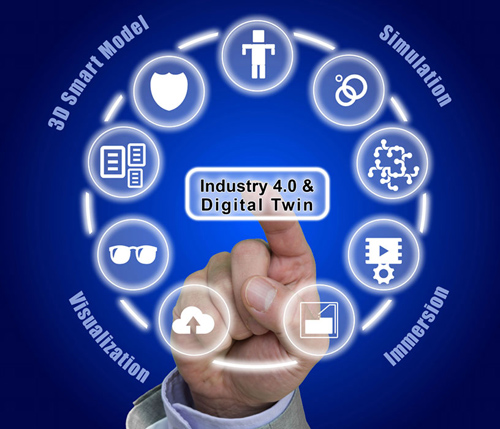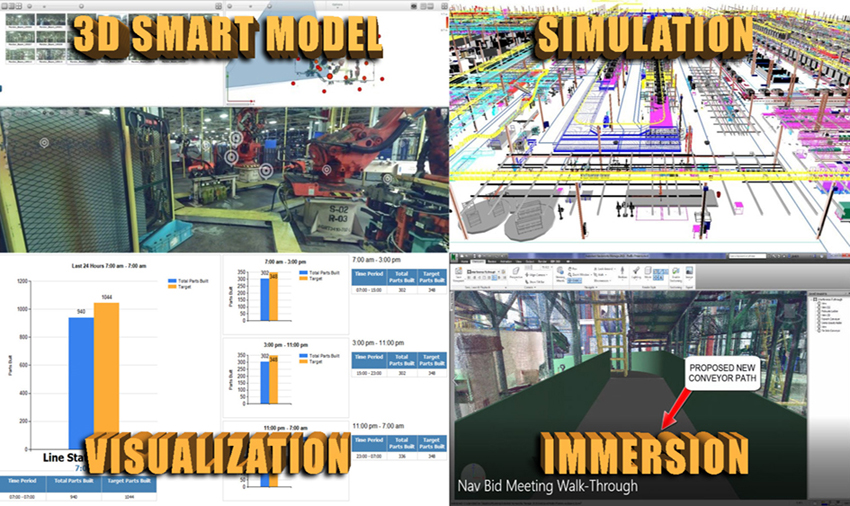 DSI uses more than three decades of on-the-ground experience to help its clients looking into industry 4.0 manufacturing to leverage the power of new technology in a number of ways, specifically within the manufacturing and industrial realm.
DSI uses more than three decades of on-the-ground experience to help its clients looking into industry 4.0 manufacturing to leverage the power of new technology in a number of ways, specifically within the manufacturing and industrial realm.
By offering the following modern industrial engineering solutions, we illustrate how the digitization of industry continues to evolve and how this evolution can help you.
Some of the applications for industry 4.0 manufacturing include the following:
- Digital Twin: Allows businesses to generate a virtual 3D model of a plant’s processes in real-time and then manipulate this to gain insights.
- Machine Vision: Vision systems can read code and automatically identify problems on the assembly line.
- Additive Manufacturing: Helps companies print their own finished parts. They can then create parts using fewer resources, reducing weight and cutting costs.
- Modular Automation: This process will introduce smaller, self contained building blocks that can be organized and arranged to increase or decrease production scale depending on the product being manufactured.
- Virtual reality manufacturing: VR manufacturing and VR engineering involves creating digital spaces that users can immerse themselves in. Using advanced phenomenon such as a VR headset, technicians experience computer-generated models in realistic 3 dimensional workspaces. AR technology such as augmented reality glasses can help maintenance and manufacturing engineers assess and complete repairs more efficiently.
- Automation: Not limited to the factory floor. In the future manufacturers utilizing advanced industry 4.0 implementation techniques will see it throughout the entire supply chain. Receiving orders, raw material purchasing, manufacturing logistics and even financial transactions will take place without the need for human intervention.
- Deep Learning: Deep learning and artificial intelligence are becoming increasingly key components to industry 4.0 manufacturing.
- Automated Guided Vehicles: AGVs will be used to speed up highly labour intensive manufacturing processes and factories will be using them to implement semi-autonomous production lines on the workfloor.
Industry 4.0 Implementation
 According to those in the know, human history has so far witnessed four industrial revolutions. The first involved the development of the steam engine, which spurred industry in previously agrarian societies.
According to those in the know, human history has so far witnessed four industrial revolutions. The first involved the development of the steam engine, which spurred industry in previously agrarian societies.
The second occurred when electricity was applied to manufacturing processes, which resulted in the mass production of goods. The digital revolution was the third industrial revolution, which included the arrival of the personal computer and the internet.
So, when one asks “What is Industry 4.0?”, you could say that in a sense, industry 4.0 is an offshoot of the digital revolution, but takes the capabilities of digital technology and pushes them to great new heights.
The same can be said of Design Systems, Inc. (DSI), an engineering consulting firm in Farmington Hills, MI whose engineering services range from supply chain consultanting, mechanical engineering consulting, Digital Twin, Industry 4.0 manufacturing and beyond.
Digital Transformation
We create a digital twin – a living model of a plant that is accessible to all stakeholders in the enterprise. The factory floor is too expensive to use as an experimental field. Completing proposed changes and operational evaluations in the digital world, we can accelerate the ROI and Time to Market.
Where is Industry 4.0 Going?
As the manufacturing industry moves toward Industry 4.0 with the use of robotics, web-based supply chains and systems (ERP, MES, etc), the future demands of Industrial Internet of Things, Artificial Intelligence, and Machine Learning also require the digitization of the factory itself – buildings, assets and systems.

Transformation to SMART FACTORY
- Facilities: 2D to 3D Virtual Models / Virtual Reality
- Assets: Spreadsheets / silos to Intelligent Models
- Systems: 2D to Dynamic Models with
- Capacity Intelligence
- Data: Disparate sources to Single Source of Truth
Project Outcomes: Creates a foundation for future technology, aggregates all plant data into a single source and is accessible to all stakeholders.
Understanding the Internet of Things: While the phrases “the internet of things” (IOT) and IIoT, the “industrial internet of things”, are thrown around quite a bit, their true meanings can be tough to discern. In the simplest terms, IOT refers to devices capable of making connections to the internet.
This could be any device, from a washer and dryer to complex machining equipment used within an industrial setting. Even components of larger machines, such as the engine in a huge jet airliner, can be included in the IOT universe.
Not only can connected devices communicate with the internet, they can also communicate with each other. In the world of industry 4.0 manufacturing, the benefits of smart equipment and Industry 4.0 implementation are seemingly endless. Work processes can become optimized, while defective equipment can be easily identified and removed from operation.
The rate in which processing takes place can also be slowed down or sped up depending on the specific conditions. Effective use of the IOT removes much of the guesswork from manufacturing by quickly performing functions that would otherwise take days or even weeks to complete.
Manufacturing Applications
When it comes to industry 4.0 manufacturing applications, businesses can achieve great things by using burgeoning tech. For instance, managing a supply chain is no easy feat, even with the right information. A single delay can tie up the entire process, while also leading to customer dissatisfaction.
Smart technology can communicate delays and make the proper adjustments to reduce hold ups. Access to the cloud is another key benefit. When information remains accessible to more people it’s easier to make important decisions that can impact the success of your business.
By the same token, this information can help you optimize your enterprise. The data produced by essential work equipment provide opportunities for growth. Patterns may emerge show that a piece of equipment is not performing as expected, and business owners will be privy to any issues at a much faster rate so they can devise an effective solution.
On-the-spot troubleshooting increases profits, prevents downtime, and assures your business can meet and exceed the needs of your clients’ time and again.
Overcoming Challenges
Of course, for some businesses utilizing new technology to its fullest potential does pose quite a few challenges. While smart devices are far more efficient and produce valuable data, they also entail a security concern. Much like computer servers, smart devices can also be accessed by unauthorized individuals. Additionally, it can be hard to keep abreast of breaches after they’ve occurred, which may lead to further security issues down the line.
Formatting is another issue. How do you ensure all of your smart devices are on the same page when it comes to formatting and internal protocols? While it can be difficult to find solutions or these and other problems, having the right assistance getting online is the first step in the right direction.
That’s where Design Systems, Inc. comes in. Our manufacturing consulting department utilizes a holistic approach to help you devise a solution to get your essential equipment connected. We’ll also ensure all data is properly encrypted, as well as optimize operations and boost profits as a result. If you’d like to speak with a friendly and knowledgeable representative, feel free to call. You can use our contact form for more information.